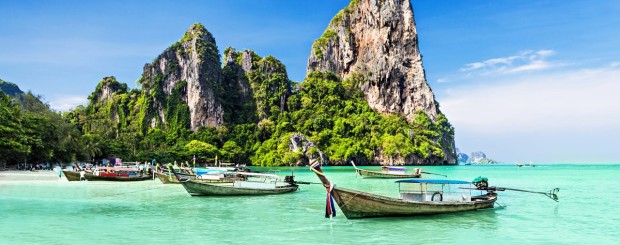Thialand Travel Tips
Have a blast on your trip but don’t forget to respect the local culture in Thailand. Check out the Thailand travel tips and advice:
The monarchy
Thai people have a deep respect and reverence for the monarchy and it’s important to show respect for the King, the Queen and the Royal Children.
Religion in Thailand
Dressing neatly in religious shrines is a must – otherwise prepare to be refused entry. Some places, such as the King’s Palace, will allow you to hire appropriate dress but you can expect hot and heavy sarong-type clothing so it’s best to turn up wearing something appropriate and comfortable from the outset. Shoulders, midriff and knees should be covered and you should wear neat footwear. Shoes are acceptable when walking around the compound of a Buddhist temple, but you’ll need to remove them before entering the chapel where the main Buddha image is kept.
Each Buddha image, large or small, ruined or not, is sacred to the Thai people. Never climb onto one to take a photograph or do anything that might be deemed as a lack of respect. Buddhist monks are forbidden to touch or be touched by a woman, or to accept anything from the hand of one. Ladies – if you’d like to give anything to a monk, you’ll need to hand it to a man to present instead.
Social norms
Most Thai’s will accept a handshake but their traditional form of greeting is the wai – a prayer-like gesture where the palms are pressed together. Generally a younger person will wai an elder, who returns it.
Thai’s regard the head as the highest part of the body (literally and figuratively) so avoid touching people on the head and try not to point your feet at people or an object. It is considered very rude. You’ll also need to remove your shoes before entering a private Thai home.
Try to keep public displays of affection with the opposite sex to a minimum as this is frowned upon.
Climate
Thailand’s climate is tropical with a mean annual temperature of 82°F and high humidity. There are three distinct seasons – the hot season from March to May, the cool season from November to February and the rainy season from about June to October.
If you’re not a fan of the heat then holiday in Thailand during the cool season – the Thai climate during this time is hardly ‘cool’ in the traditional sense but you’ll find temperatures a lot easier to handle dropping to about 70°F in the central region and 57°F in the north.
Electricity
The electric current in Thailand is 220V and the cycle is 50Hz. The sockets in Thailand will take both the flat and round prongs but an adapter may be necessary.
Fast facts
Population: 65,000,000 Languages spoken: Thai
Time zones: GMT + 7 (Indochina Time) Currency: Baht (THB)
Country dialing code: +66 Weights & measure: Metric
What to take with you
To give you a rough idea of what to take with you when travelling in Thailand, you will need to think about the following:
Lightweight clothing – it is hot and sunny in a lot of places for most of the year so shorts and t-shirts will be the staple. Having said that, the north of the country gets a little chilly in the winter and you’d be wise to bring a couple of warm things. Flips flops or thongs are comfortable, cool and versatile. If you are going trekking in the jungle you’ll need some sturdy boots.
Waterproofs – just in case you are going to be there in the wet season.
Travel adapter – if you are taking electrical items with you like a hairdryer or phone charger to Thailand they do not use the same plugs so, you will need an adapter.
Sun block and mosquito repellent are both an absolute must!
When to go
The best time to visit is between November and March when the weather in Thailand is optimum and you’ll be able to take full advantage of the Thailand beaches (although Koh Samui is best from June to September). November to March is also Thailand’s main period of national and regional festivals.
The peak tourist season is November to late March, with secondary peak months in July and August. If you’re keen to avoid the crowds and take advantage of discounted rooms and low-season rates, why not travel during the less crowded months (April to June, September and October). On the other hand it’s easy to leave the crowds behind – just avoid the most popular destinations (eg Chiang Mai and all islands and beaches).
Tourist visa
Your nationality will determine whether you need to get a visa and how long you can stay. Citizens from a large list of countries including the US can visit Thailand visa-free for up to 30 days – plenty of time for most. For longer stays you should apply for a tourist visa from Thai immigration allowing you remain in the country for up to 60 days. Lets Go Travels & Tours can provide you the assistance to obtain visa. Please visit www.Letsgotravelstours.com for this service.
Medical services
Thailand health care is of a good standard in all the major tourist destinations. Most have hospitals or clinics staffed by well-trained doctors and nurses. An ambulance can be summoned from a private hospital in the case of an emergency.
Water
Avoid drinking the tap water to ensure you don’t get sick. Make sure you stock up on bottled water.
Safety and security
Below are a few hints and tips to ensure you have a hassle-free trip to Thailand:
- Beware of unauthorized people who offer their services as guides. You could end up going somewhere completely different from where you intended or paying through the nose. For all tourist information, phone the Tourism Authority of Thailand on 1672.
- Observe the usual precautions with regards to personal safety and the safety of your passport, airline tickets, money, jewellery and other belongings. Most hotels will have a safety deposit box either in the room or at reception so make use of that, otherwise when walking make sure all zips and bag openings are closed and secured. Walking alone on quiet streets or deserted areas is not recommended. Visitors needing assistance relating to safety, unethical practices, or other matters, should phone the Tourist Police on 1155.
- Do your bit to keep the streets clean – drop your garbage into a waste container. The Bangkok Metropolitan Administration strictly enforces the law in an effort to keep the city clean and will fine anyone caught spitting, discarding cigarette stubs, or dropping rubbish in public areas.
- Do not get yourself involved with drugs. Penalties for drug offenses are very severe in Thailand including long jail sentences or even death.
- Don’t support wild animal trafficking or abuse and never purchase any products or souvenirs made from wild animals including reptiles like snakes, monitor lizards, and also turtle shell and ivory. Avoid local restaurants that serve wild animal delicacies as it is against the law to slaughter wildlife for food in Thailand.
Travel insurance
Don’t leave home without it! Accidents happen – and they can happen in the strangest places at the strangest times, like on the side of a mountain in Krabi or in an alley in Bangkok at 3 am. Travel insurance can cover you for all sorts of mishaps during your travel, and even before you leave. Did you know up to 25% of all insurance claims are due to cancellation of travel?
Check out the SPI Insurance Copmany Limited policies and get the one that is right for you from www.Letsgotravelstours.com
Organized tours
Organized tours are a great way to see the sites and soak up the local culture – especially if you’re traveling alone or are a first-time traveler. Check out some of the options from www.letsgotravelstours.com
Scams
Unfortunately, being a foreign tourist means looking like a walking dollar sign sometimes. Many Thailand scams have been around for decades; you can avoid getting ripped off if you know about them in advance.
Use this list of scams in Thailand to avoid being a sucker!
Fast, bustling, insane – Thailand’s busy capital of Bangkok may be a lot of things, but predictable will never be one of them. These Bangkok tips will help you make sense of the chaos! Bangkok has a reputation for wearing out new travelers on their first visit. Luckily, there is hope.
A few simple Bangkok travel tips from experienced travelers can help make your landing in Thailand just a little softer!
- Cigarette Smoking Scam
Despite seeing locals do it, never drop a cigarette in tourist places. Bangkok police set up sting operations in front of MBK to watch for smokers and demand a cash fine on the spot.
- Don’t Bring Expensive Flip-Flops
Nice or expensive flip-flop sandals have a nasty habit of disappearing quite easily in Thailand — particularly in the islands. The reason being that you have to remove them to enter places, and people swap with you on the way out.
- Always Lock Up Your Motorbike
Always lock up your rented motorbike, and don’t leave the helmet or other belongings in the basket. Motorbikes are frequently stolen in Thailand – sometimes even by the agency that rented it to you!
- Make Taxi Drivers Use the Meter
Some taxi drivers will refuse to use the meter or claim that it is broken. They claim traffic is too bad or a destination is too far for the meter. Ignore them and hail an honest driver; be patient – there are a few.
- Don’t Pay Entrance at the Full Moon Party
Don’t buy the “entrance bracelets” from people blocking access to the beach during the Koh Phangan Full Moon Party. There is no entrance charge to the party and these people are scammers selling overpriced bracelets.
- Beware of Local Girls
If you are dumb enough to take a prostitute or local girl to your room, don’t be surprised if you wake up with money or items missing. Some will even spike your drink, flirt, then rob you after you pass out.
- Careful When Renting Motorbikes
Check motorbike rentals carefully for scratches or damage before you take them. The agency will demand large fines when you return the bike with insignificant scratches they think you made.
Theft is common on overnight “VIP” buses in Thailand. They literally pick through bags in the luggage hold as the bus rolls…
- Don’t Ask for Recommendations
Never trust someone’s recommendation for a bar, restaurant, or hotel. You will end up in a friend’s or cousin’s second-hand place because drivers and locals want to send business to friends and family.
- Never Use Parked Drivers
Drivers parked and waiting for tourists will invariably charge you more. Hail your own taxi on the street, and insist that the driver use the meter before you get inside. Never try to negotiate your fare, you will fail.
- Drivers Do Not Carry Change
Both tuk-tuk and taxi drivers rarely have change. Try to keep small bills to pay close to your exact fare. Round up for a small tip, but don’t expect them to break big notes. They will claim to not have change.
- Tuk-Tuk Scams
Avoid the age-old scam of accepting a tuk-tuk driver’s offer of driving you somewhere for cheap in exchange to visit three shops. The shops are rude, will waste your time, and sales pressure will be high. Get a taxi instead.
- Don’t Trust the Drivers
Tuk-tuk drivers are the biggest scammers in Thailand. Metered taxis are always cheaper – make them use the meter – and more comfortable. Never believe if a driver says a place is closed.



